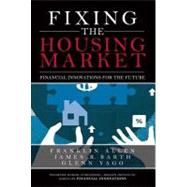
What is included with this book?
| Acknowledgments | p. vi |
| About the Authors | p. viii |
| About the Milken Institute | p. x |
| Housing Crises Go Global: The Boom, the Bust, and Beyond | p. 1 |
| Building Blocks of Modern Housing Finance | p. 21 |
| Turmoil in Global Housing Markets: Implications for the Future of Housing Finance | p. 69 |
| Housing Finance in the Emerging Economies | p. 103 |
| Future Innovations in Housing Finance | p. 139 |
| Lessons LearnedùBack to the Future | p. 171 |
| Index | p. 181 |
| Table of Contents provided by Ingram. All Rights Reserved. |
The New copy of this book will include any supplemental materials advertised. Please check the title of the book to determine if it should include any access cards, study guides, lab manuals, CDs, etc.
The Used, Rental and eBook copies of this book are not guaranteed to include any supplemental materials. Typically, only the book itself is included. This is true even if the title states it includes any access cards, study guides, lab manuals, CDs, etc.